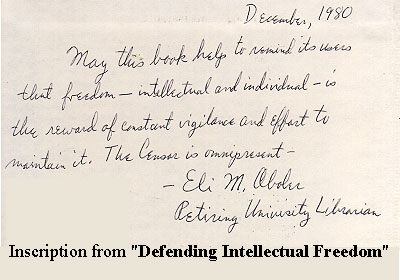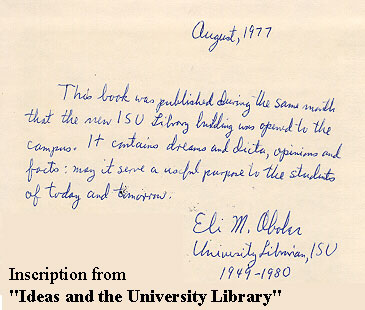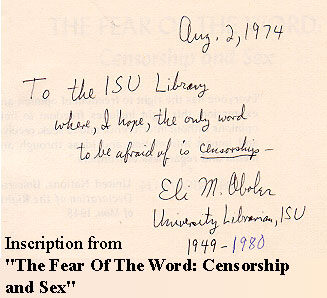

Eli M. Oboler (1915-1983) took a very active role in the library community, and he greatly influenced the struggle against censorship in the 1950s, 1960s, and 1970s. His ideas were disseminated through his involvement in library associations such as the American Library Association, the Pacific Northwest Library Association, and the Idaho Library Association, which he helped to organize in 1950. Even more far-reaching than his active involvement in key issues of his day, though, are his writings, which still speak today though he himself is now silent. A partial bibliography fills about ten pages, and we encourage you to seek out these books and essays at your Library. A few quotations are included here to give a sense of who Mr. Oboler was and what he felt was important. Also on this page you will find his inscriptions from books he donated to the Idaho State University Library; seeing his handwriting can give a further sense of the man behind the words.
"That theme [of the book] - which, I suppose is that of my professional life and career - is that man is by nature free in mind as well as in body, and that librarians, of all mankind, are (or should be) the leaders in explanation, defense, promulgation, and practice of intellectual freedom."
--From the Preface to Defending Intellectual Freedom: The Library and the Censor. Westport, CT: Greenwood Press, 1980, p. xviii.
"The thoughts that are not permitted to be expressed may be the very ones that most need to be expressed. Unless they are printed or otherwise made available for mass consideration, how are we going to know?"
--Defending Intellectual Freedom: The Library and the Censor. Westport, CT: Greenwood Press, 1980, p. 228.
"This is a library planned both to preserve reading materials and to permit them to be used easily and efficiently. Without readers any library is but a vast mausoleum; with you, the words in the books come alive and once more are part of the great active heritage of Western culture."
--"Invitation." Idaho Librarian 7, 2 (April, 1955), pp. 37-41. Also appears as "The Scholarly Library" in Ideas and the University Library: Essays of an Unorthodox Academic Librarian. Westport, CT: Greenwood Press, 1977, p. 12
"The basic responsibility of the faculty of a university is to encourage and to disseminate ideas of past time, our time, and of time to come. Nowhere else in our society can this obligation be placed."
--"Ideas and the State University." School and Society 95, 2287 (February 4, 1967), pp. 78-80. Also appears in Ideas and the University Library, p. 15.
"Has anyone thought of the possibility that reading is simply becoming a vestigial ability and being superseded by listening and looking?"
--"Miscellanea Number 35" in Ideas and the University Library, pp. 182-83.

"The Library Patron's Bill of Rights." Idaho Librarian 14, 3 (July, 1962), pp. 59-62. Also appears in Ideas and the University Library, p. 93.
